1. Early Life and Education
Derek Jeter's early life was marked by a strong family foundation and a burgeoning passion for baseball, influenced significantly by his parents and a childhood idol.
1.1. Birth and Family Background
Derek Sanderson Jeter was born on June 26, 1974, in Pequannock Township, New Jersey. His mother, Dorothy (née Connors), is an accountant of English, German, and Irish ancestry. His father, Sanderson Charles Jeter, holds a PhD and worked as a substance abuse counselor; he is African-American. His parents met while serving in the United States Army in Germany. His father played baseball as a shortstop at Fisk University in Tennessee. Derek's younger sister, Sharlee (born in 1979), was also a softball star in high school. His parents instilled a strong sense of discipline and positivity in their children, requiring Derek to sign an annual contract outlining acceptable behaviors. Dorothy specifically encouraged him to avoid using the word "can't".
1.2. Childhood and Early Influences
The Jeter family resided in New Jersey until Derek was four, at which point they relocated to Kalamazoo, Michigan. While the children lived with their parents in Kalamazoo during the school year, they spent their summers with their grandparents in West Milford, New Jersey. During these summer visits, Jeter developed a deep affection for the New York Yankees by attending their games with his grandparents. He cites watching the Yankees' star outfielder Dave Winfield as a primary inspiration for his own pursuit of a baseball career. Jeter began playing little league baseball at the age of five.
1.3. High School and College Baseball
Jeter attended Kalamazoo Central High School, where he was a multi-sport athlete, participating in cross country running in the fall, basketball in the winter, and baseball in the spring. He exhibited exceptional talent in baseball, achieving impressive batting averages: .557 in his sophomore year and .508 as a junior. In his senior year, he maintained a .508 batting average, recording 23 RBIs, 21 walks, four home runs, a .637 on-base percentage (OBP), an .831 slugging percentage (SLG), 12 stolen bases (in 12 attempts), and only one strikeout.
His senior year brought him numerous honors, including the Kalamazoo Area B'nai B'rith Award for Scholar Athlete, the 1992 High School Player of the Year Award from the American Baseball Coaches Association, the 1992 Gatorade High School Player of the Year, and USA Today-s High School Player of the Year. He also earned an All-State honorable mention in basketball. Jeter's baseball prowess earned him a scholarship to the University of Michigan to play college baseball for the Michigan Wolverines. In recognition of his achievements, Kalamazoo Central High School inducted Jeter into its athletic hall of fame in 2003 and subsequently renamed its baseball field in his honor in 2011.
2. Professional Career
Derek Jeter's professional baseball journey was entirely spent with the New York Yankees, beginning with his draft out of high school and culminating in a storied 20-year career that solidified his status as a baseball icon.
2.1. MLB Draft
In the 1992 Major League Baseball draft, the Houston Astros held the first overall pick. Hall of Fame pitcher Hal Newhouser, then a scout for the Astros, had extensively evaluated Jeter and strongly advocated for his selection, convinced he would become a formidable hitter. However, the Astros feared Jeter would demand a salary bonus of at least 1.00 M USD to forgo his college commitment. Instead, they selected Phil Nevin, an outfielder from Cal State Fullerton, who signed for 700.00 K USD. Newhouser felt so passionately about Jeter's potential that he resigned from his position with the Astros in protest of their decision.
The Yankees, holding the sixth pick, also highly rated Jeter. Yankees scout Dick Groch, responsible for scouting the Midwest, observed Jeter at an all-star camp held at Western Michigan University. Despite concerns among Yankees officials that Jeter might opt for college over a professional contract, Groch persuaded them to draft him, famously stating, "the only place Derek Jeter's going is to Cooperstown." The picks between the Astros and Yankees were Paul Shuey, B. J. Wallace, Jeffrey Hammonds, and Chad Mottola; these five players combined for only two All-Star Game appearances (Nevin and Hammonds) throughout their careers. The Yankees drafted Jeter, who chose to turn professional, signing for 800.00 K USD.
2.2. Minor League Career (1992-1995)
Jeter spent four seasons in Minor League Baseball, then formally known as the National Association of Professional Baseball Leagues (NAPBL). He began the 1992 season with the Gulf Coast Yankees of the Rookie-level Gulf Coast League, based in Tampa, Florida. His professional debut was challenging: he went 0-for-7 with five strikeouts in his first game. He continued to struggle throughout the remainder of the season, batting only .202 in 47 games. Manager Gary Denbo even benched him in the final game to prevent his average from falling below the Mendoza Line, a baseball term for a .200 batting average. Homesick and frustrated by his lack of success, Jeter accumulated monthly phone bills of 400 USD from daily calls to his parents.
The Yankees promoted Jeter to the Greensboro Hornets of the Class A South Atlantic League (SAL) to provide him with more at-bats. He initially batted .247 in his first 11 games with Greensboro and struggled defensively, committing nine errors in 48 chances. Weighing only 156 lb (156 lb), his scrawny appearance seemed to contradict his reputation as the Yankees' future star. Teammates Jorge Posada and Andy Pettitte, who also played for the Hornets that season, initially questioned the hype surrounding Jeter but soon recognized his talent and composure.
Jeter dedicated his next offseason to improving his fielding. Baseball America ranked him 44th among the top 100 prospects in baseball before the 1993 season. Returning to the Hornets in 1993, his first full professional season, Jeter hit .295 with five home runs, 71 RBIs, and 18 stolen bases. SAL managers voted him the "Most Outstanding Major League Prospect" in the league. He finished second in the SAL in triples (11), third in hits (152), and eleventh in batting average, earning a spot on the postseason All-Star team. Despite committing a SAL-record 56 errors, he was named the SAL's Best Defensive Shortstop, Most Exciting Player, and Best Infield Arm by Baseball America.
Heading into the 1994 season, Baseball America considered Jeter the 16th-best prospect in baseball. He played for the Tampa Yankees of the Class A-Advanced Florida State League (FSL), the Albany-Colonie Yankees of the Class AA Eastern League, and the Columbus Clippers of the Class AAA International League. Across these three levels, he combined to hit .344 with five home runs, 68 RBIs, and stole 50 bases. His performance earned him Minor League Player of the Year Awards from Baseball America, The Sporting News, and Topps/NAPBL. He was also named the most valuable player of the FSL and the New York Yankees Minor League Player of the Year.
For the 1995 season, Baseball America ranked Jeter as the fourth-best prospect in baseball, and he was projected to be the Yankees' starting shortstop. However, after the 1994 regular season, he sustained mild inflammation in his right shoulder while playing in the Arizona Fall League. As a precaution, the Yankees signed Tony Fernández to a two-year contract. With Fernández set to start at shortstop, Jeter was assigned to Class AAA. During the 1994-95 Major League Baseball strike, Gene Michael, the Yankees' general manager, offered Jeter the opportunity to train with replacement players in spring training. Jeter declined the offer, choosing not to cross the picket line.
2.3. Major League Career: New York Yankees (1995-2014)
Derek Jeter's 20-year career with the New York Yankees is a testament to his consistent performance, clutch hitting, and unwavering leadership, contributing significantly to one of baseball's modern dynasties.
2.3.1. Early Success and Dynasty Years (1995-2002)

Early in the 1995 season, injuries to Fernández and infielder Pat Kelly led to Jeter's MLB debut on May 29, 1995. He was assigned uniform number 2. Batting ninth, he went hitless in five at bats, striking out once. The following day, he recorded his first two major league hits and scored his first two career runs. Jeter batted .234 and committed two errors in 13 games before being sent back to Class AAA Columbus, with Fernández returning to shortstop. Though not on the active roster, Jeter traveled with the Yankees during the 1995 American League Division Series (ALDS), where they lost to the Seattle Mariners.
After Fernández's disappointing .245 batting average and injury-limited 108 games in 1995, newly hired Yankees manager Joe Torre decided to make Jeter the starting shortstop for the 1996 season, hoping for a .250 average and reliable defense. Yankees owner George Steinbrenner was initially skeptical, nearly approving a trade to send pitcher Mariano Rivera to the Mariners for shortstop Félix Fermín. However, Vice President of Scouting Gene Michael and Assistant General Manager Brian Cashman convinced Steinbrenner to give Jeter a chance.
Ranked the sixth-best prospect by Baseball America entering the 1996 season, Jeter started on Opening Day, becoming the first Yankee rookie to start at shortstop since Tom Tresh in 1962. He hit his first MLB home run that day. Batting ninth, his speed and ability to execute the hit and run complemented leadoff hitter Tim Raines. Jeter exceeded expectations, batting .314 with 10 home runs, 104 runs scored, and 78 RBIs. He was a unanimous choice for the AL Rookie of the Year, receiving all 28 first-place votes, marking only the fifth such sweep in the award's 50-year history.

In the 1996 postseason, Torre moved Jeter to the leadoff spot. During Game 1 of the 1996 American League Championship Series (ALCS), with the Yankees trailing the Baltimore Orioles 4-3 in the eighth inning, Jeter hit a fly ball that was ruled a home run after 12-year-old fan Jeffrey Maier reached over the wall to catch it, tying the game. This controversial play marked Jeter's first postseason home run. The Yankees won the game and defeated the Orioles in five games. Jeter batted .361 in the 1996 postseason, offensively leading the Yankees with Bernie Williams while other key players struggled. The Yankees went on to defeat the Atlanta Braves in the 1996 World Series, securing their first championship since the 1978 World Series.
Following his Rookie of the Year season, Jeter was recognized as part of a rising "new crop" of MLB shortstops, alongside Alex Rodriguez and Nomar Garciaparra, as older stars like Cal Ripken Jr. were nearing the end of their careers. Rodriguez, the first overall pick in the 1993 MLB draft, reached out to Jeter about his experiences, and the two became close friends, despite being on-field rivals.
For the 1997 season, Jeter and the Yankees agreed to a 540.00 K USD contract with performance bonuses. As the Yankees' new leadoff batter, he hit .291 with 10 home runs, 70 RBIs, 116 runs, and 190 hits. Despite hitting two home runs in the 1997 American League Division Series, the Yankees lost to the Cleveland Indians three games to two.
Jeter earned 750.00 K USD for the 1998 season. He was selected for his first All-Star Game that year. In the regular season, he batted .324 with a league-leading 127 runs, 19 home runs, and 84 RBIs for a team that won 114 games and is widely considered one of the greatest of all time. In the playoffs, Jeter struggled, hitting just .176 in the ALDS and ALCS. However, he rebounded in the 1998 World Series, batting .353 as the Yankees swept the San Diego Padres in four games. At season's end, Jeter finished third in the voting for the AL Most Valuable Player (MVP) Award.
2.3.2. 1999-2002

After becoming eligible for salary arbitration for the first time before the 1999 season, Jeter was awarded a 5.00 M USD salary. That season, he led the AL with 219 hits and finished second in batting average (.349) and runs scored (134), earning his second All-Star selection. His season totals in batting average, runs, hits, RBIs (102), doubles (37), triples (9), home runs (24), SLG (.552), and OBP (.438) were all personal bests. In the postseason, Jeter batted .455 in the ALDS, .350 in the ALCS, and .353 in the World Series, as the Yankees defeated the Braves to win another championship.
During the 1999-2000 offseason, the Yankees and Jeter tentatively agreed to a seven-year, 118.50 M USD contract. However, owner George Steinbrenner, hesitant to set a record for the largest contract, delayed the deal. When a reported eight-year, 143.00 M USD extension between Juan González and the Detroit Tigers fell through, so did Jeter's tentative agreement. To avoid arbitration, Jeter and the Yankees settled on a one-year, 10.00 M USD deal.
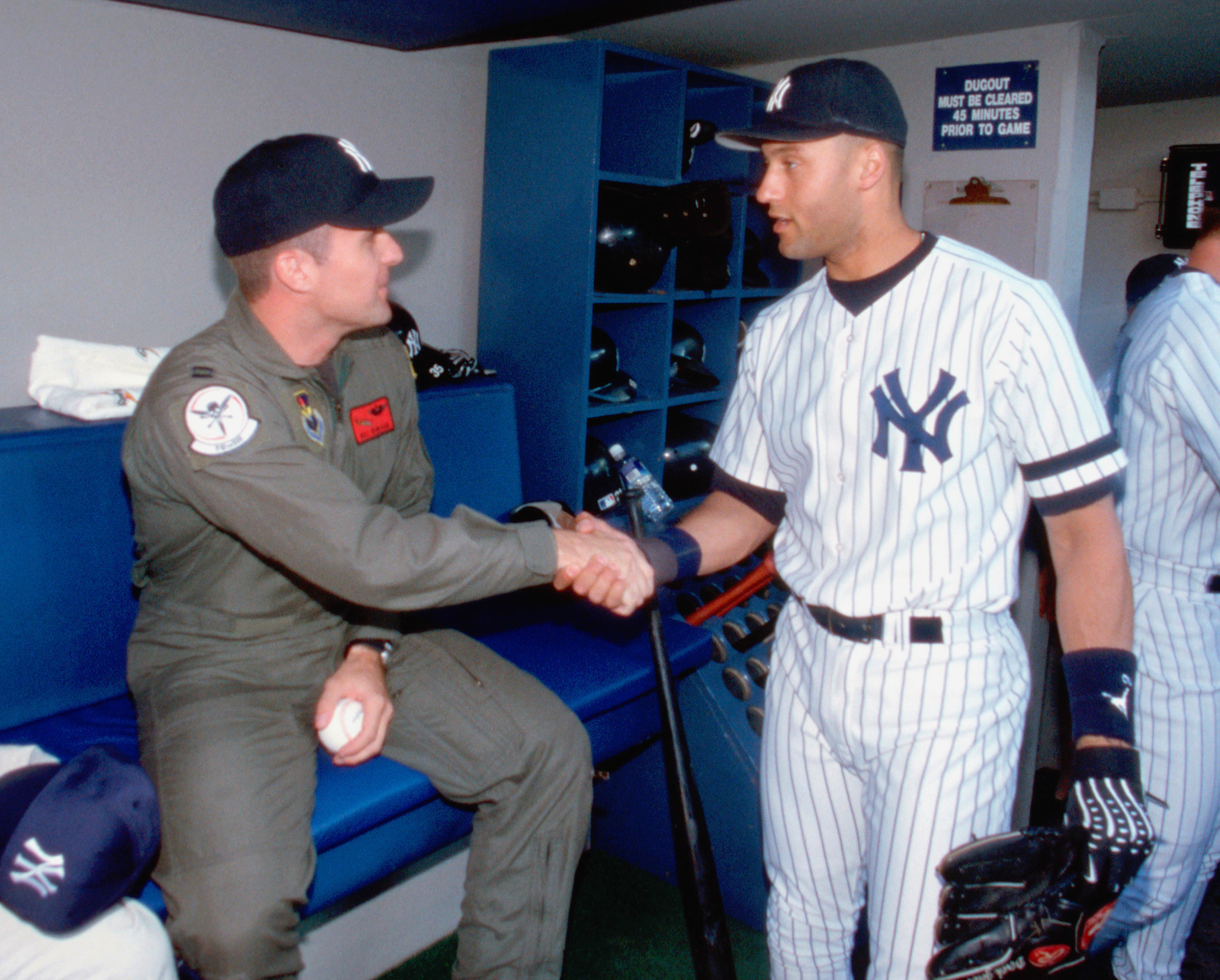
Jeter batted a team-best .339 in the 2000 regular season, adding 15 home runs, 73 RBIs, 119 runs scored, and 22 stolen bases. In the 2000 MLB All-Star Game, he recorded three hits, including a two-run single that secured his team's victory, earning him the All-Star Game MVP Award, the first Yankee to win the honor. In the postseason, he batted just .211 in the ALDS against the Oakland Athletics, but rebounded to hit .318 in the ALCS against the Seattle Mariners, and .409 in the World Series against the New York Mets. Jeter hit two home runs, a triple, and two doubles in the World Series, including a leadoff home run on the first pitch of Game 4 and a triple later in the third inning. His Game 5 home run tied the game and extended his World Series hitting streak to 14 games. The Yankees defeated the Mets in five games for their third consecutive title and fourth in Jeter's first five full seasons. Jeter won the World Series MVP Award, becoming the first (and only) player to win both the All-Star Game MVP and World Series MVP Awards in the same season.
With one year remaining until he was eligible for free agency, Jeter signed a ten-year, 189.00 M USD contract before the 2001 season to remain with the Yankees. This deal followed Alex Rodriguez's ten-year, 252.00 M USD contract with the Texas Rangers earlier that offseason, which had set the market for Jeter's negotiations. Jeter became the second-highest-paid athlete across all team sports and auto racing, trailing only Rodriguez. The 18.90 M USD average annual value of Jeter's contract was the third-highest in baseball at the time, behind Rodriguez (25.20 M USD) and Manny Ramirez (20.00 M USD).
In 2001, Jeter batted .311 with 21 home runs, 74 RBIs, 110 runs scored, and 27 stolen bases, making his fourth All-Star appearance. He made a memorable defensive assist in Game 3 of the ALDS against the Athletics. With Jeremy Giambi on first base, Oakland right fielder Terrence Long hit a double. As Giambi rounded third base and headed for home plate, Yankees right fielder Shane Spencer made a wild throw. Jeter, running from shortstop, grabbed the ball and flipped it backhanded to catcher Jorge Posada, who tagged Giambi out just before he crossed home plate, preserving the Yankees' one-run lead. This play, known as "The Flip", was later voted seventh in Baseball Weekly-s 10 Most Amazing Plays of all time and won the 2002 Best Play ESPY Award.
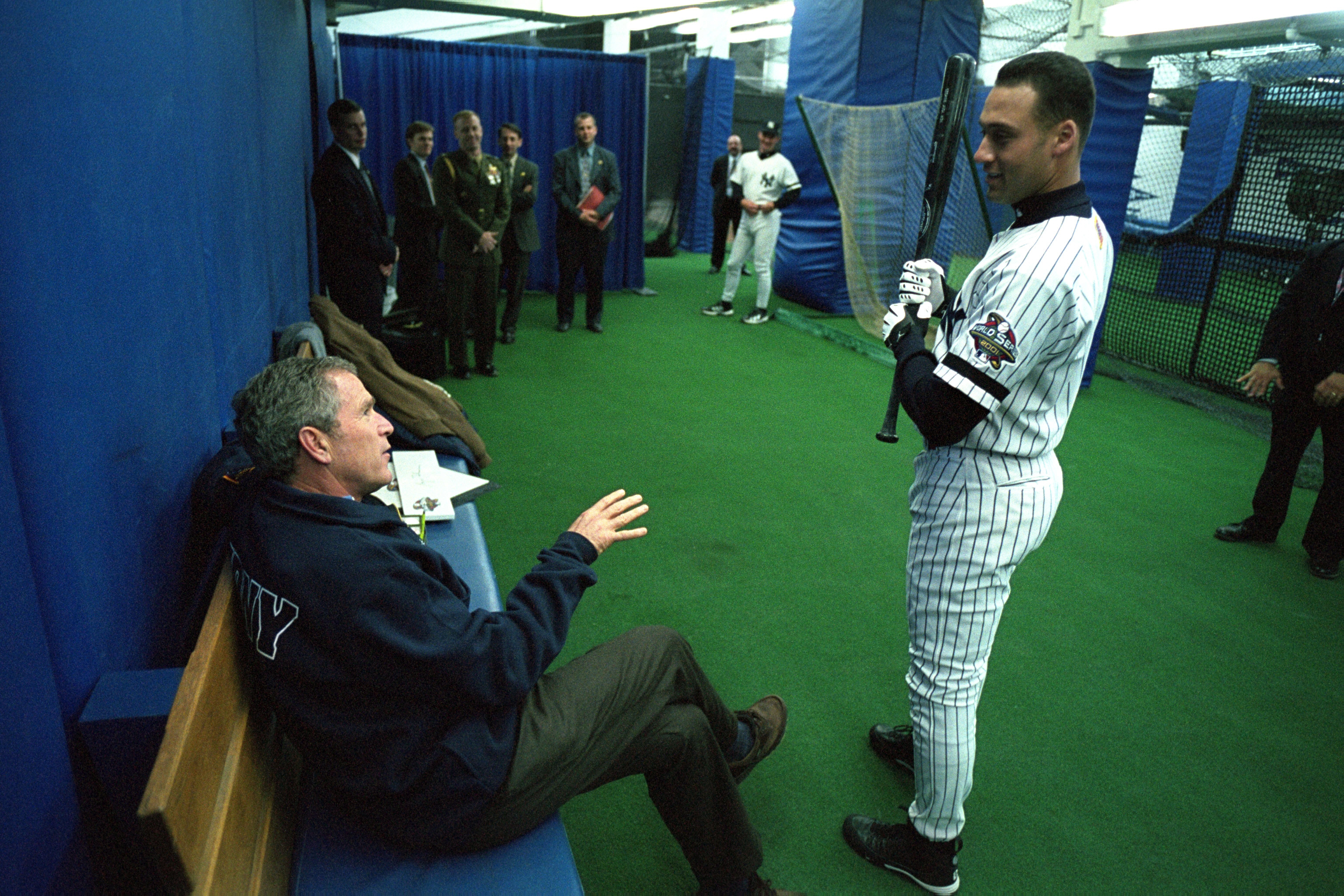
As a result of the September 11 attacks, the start of the playoffs was delayed, extending the season into November. The Yankees advanced to the 2001 World Series to face the Arizona Diamondbacks. Game 4 marked the first time a non-exhibition MLB game had been played in November. In extra innings, Jeter hit a game-winning home run off of Byung-hyun Kim. The scoreboard flashed "Mr. November", a nod to former Yankee Reggie Jackson's "Mr. October" nickname. Despite this heroic moment, Jeter struggled at the plate in the series, batting .148 as the Yankees lost in seven games. He denied injuries were a factor, though a fall into a photographer's box during a foul ball attempt might have aggravated a hamstring injury.
In the 2002 regular season, Jeter batted .297 with 18 home runs, 75 RBIs, 124 runs scored, 191 hits, and a career-best 32 stolen bases. He led the majors in stolen base percentage (91.4%), getting caught only three times. He made his fifth All-Star appearance. In the 2002 postseason, the Anaheim Angels defeated the Yankees in the ALDS on their way to winning the World Series.
2.3.3. Captaincy and Individual Achievements (2003-2008)
On Opening Day of the 2003 season, Jeter dislocated his left shoulder in a collision with Toronto Blue Jays catcher Ken Huckaby at third base. He was placed on the disabled list for six weeks, missing 36 games-his fewest since his debut. He returned to bat .324, finishing third in batting average in the AL, behind Bill Mueller (.326) and Manny Ramirez.
On June 3, 2003, George Steinbrenner named Jeter the captain of the Yankees, a position that had been vacant for eight seasons since Don Mattingly's retirement in 1995. In that postseason, Jeter batted .314 with two home runs, five RBIs, and 10 runs scored across 17 playoff games, including three hits in Game 3 of the 2003 World Series against the Florida Marlins-the only three hits Josh Beckett allowed in the game. However, Jeter committed a crucial error in a Game 6 loss, and the Marlins went on to win the series in six games.
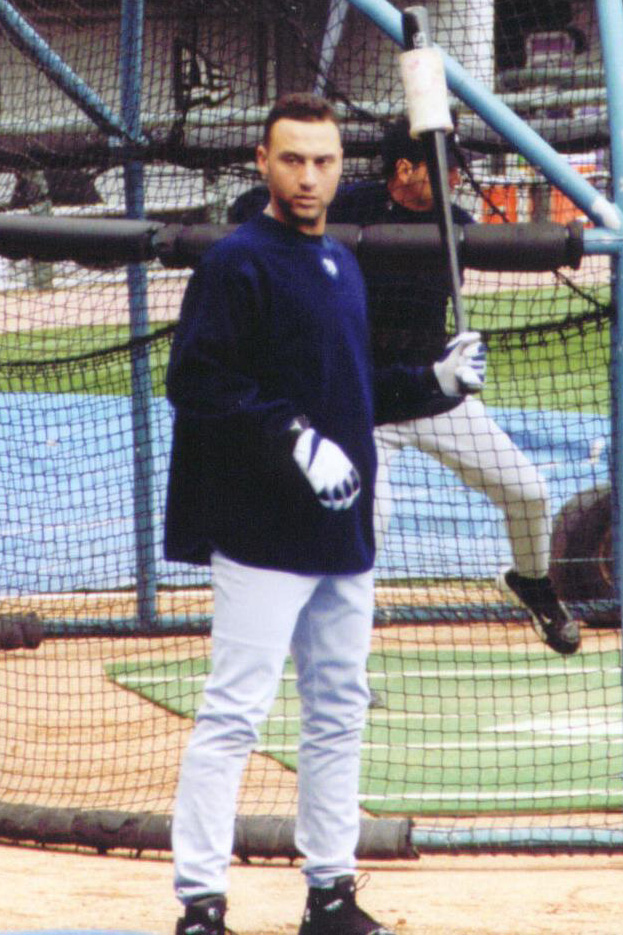
The Yankees acquired Alex Rodriguez from the Texas Rangers during the 2003-04 offseason. Rodriguez, who had won two Gold Glove Awards at shortstop and was considered the best shortstop in baseball, moved to third base, allowing Jeter-who had no Gold Gloves at the time-to remain the team's starting shortstop. Rodriguez's increased fielding range allowed Jeter to shade more towards his left, compensating for a known weakness in fielding balls hit to that side. The 2004 season began with Jeter in a deep slump, at one point getting only one hit in 36 at-bats, dropping his average to .168 through April. He gradually improved, reaching .277 by the All-Star break in July.
Jeter was selected for the All-Star team and finished the 2004 season with a .292 average, 23 home runs (his second-most in a season), 78 RBIs, 111 runs scored, and a career-best 44 doubles, breaking Tony Kubek's 1961 Yankees single-season record for doubles by a shortstop. He batted .316 with a team-leading four RBIs as the Yankees defeated the Minnesota Twins in the 2004 ALDS. However, Jeter struggled in the 2004 ALCS, batting .200 with only one extra-base hit, as the Yankees lost the series to the Red Sox in seven games, despite winning the first three.
On July 1, 2004, in the 12th inning of a tied game against the rival Boston Red Sox, Trot Nixon hit a pop fly down the left field line. Jeter made an incredible over-the-shoulder catch, leaping over the third-base side railing and into two rows of seats. He sustained a lacerated chin and bruised face but held onto the ball. The Yankees went on to win the game in the bottom of the 13th inning. This play was voted the Play of the Year in the This Year in Baseball Awards competition by fans on MLB.com. Following the 2004 season, Jeter was awarded his first Gold Glove Award, with this diving catch cited as a key factor. However, despite being fourth among shortstops in traditional fielding statistics like fielding percentage and errors, critics pointed to his lower ratings in advanced sabermetric statistics such as range factor and ultimate zone rating (UZR).
In the 2005 season, Jeter was second in the AL in runs scored (122) and third in both at-bats (654) and hits (202). Despite continued criticism regarding his defensive liabilities, he won his second consecutive Gold Glove. While Orlando Cabrera of the Angels had a higher fielding percentage and fewer errors, voters noted Jeter's higher number of assists. Although Jeter batted an impressive .333 during the 2005 ALDS, the Yankees lost to the Angels.

For the 2006 season, the Yankees signed Johnny Damon to play center field and bat leadoff, moving Jeter to the second spot in the batting lineup. During the 2006 season, Jeter recorded his 2,000th career hit, becoming the eighth Yankee to reach this milestone. He finished the season second in the AL in both batting average (.343) and runs scored (118), third in hits (214), and fourth in OBP (.417), earning his seventh All-Star selection. Jeter excelled in the 2006 ALDS, batting .500 with one home run, including a perfect 5-for-5 performance in Game 1, making him the sixth player to record five hits in a postseason game. Despite his efforts, the Yankees lost to the Detroit Tigers three games to one.
Many observers expected Jeter to win the AL MVP Award for 2006. In a close vote, he finished second to Justin Morneau of the Twins. While he lost the MVP Award, he won the Hank Aaron Award, given for superior offensive performance. He also secured his third consecutive Gold Glove Award.

Despite the Yankees' ongoing postseason struggles, Jeter remained a consistent contributor. During the 2007 season, he finished third in the AL with 203 hits, marking his third consecutive and sixth overall season with at least 200 hits. He also finished ninth in batting average (.322) and was selected for his eighth All-Star appearance. Defensively, he was involved in turning a career-high 104 double plays. However, he struggled during the 2007 ALDS, batting only .176 with one RBI, as the Indians defeated the Yankees.
Jeter hit his 400th career double on June 27, 2008, and his 200th home run on July 12. His slugging percentage (SLG) dropped to .410 in the 2008 season, his lowest mark since 1997. Jeter was elected to his ninth All-Star Game as the starting shortstop and finished the season with a .300 batting average.
On September 14, 2008, at Yankee Stadium, Jeter tied Lou Gehrig's record for hits at the venue (1,269) with a home run off Tampa Bay Rays pitcher David Price. Two days later, on September 16, he broke that record against Chicago White Sox pitcher Gavin Floyd. The Yankees were eliminated from postseason contention that year, the only full season in Jeter's career where he did not participate in the playoffs. Following the final game in the original Yankee Stadium's history, Jeter delivered a memorable speech at the Yankees' request, thanking the fans for their unwavering support. This moment was later voted the Moment of the Year in MLB.com's This Year in Baseball Awards.
2.3.4. Breaking Records and Final Seasons (2009-2014)
For the 2009 season, Yankees manager Joe Girardi switched Jeter and Damon in the batting order, with Damon moving to second and Jeter returning to the leadoff role. Jeter batted .334, the third-best in the AL, with a .406 OBP, an .871 OPS, 18 home runs, 66 RBIs, 30 stolen bases in 35 attempts, 107 runs scored, 72 walks, and 212 hits (second in MLB). Defensively, he committed a career-low eight errors, and his .986 fielding percentage was his career best. The addition of Gold Glove-winning first baseman Mark Teixeira allowed second baseman Robinson Canó to focus more on balls to his right, which indirectly helped Jeter's defensive performance. During the season, Sporting News named Jeter eighth on their list of the 50 greatest current players in baseball.
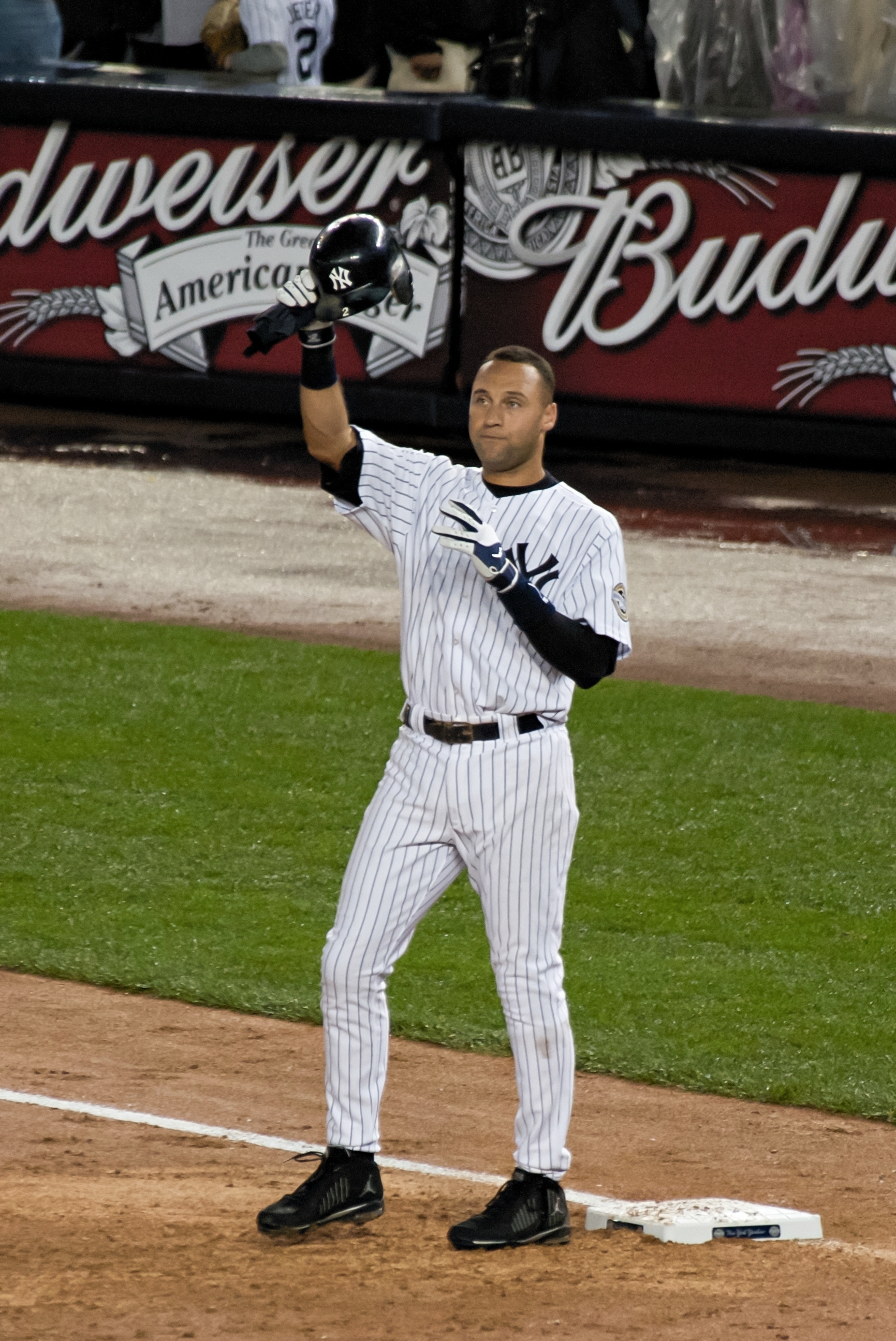
Jeter achieved two significant career hit milestones in the second half of the 2009 season. On August 16, against the Seattle Mariners, Jeter doubled down the right-field line for his 2,675th hit as a shortstop, breaking Luis Aparicio's previous major league record. Then, on September 11, 2009, Jeter became the all-time hits leader as a member of the Yankees, surpassing Lou Gehrig's record with a single off Baltimore Orioles pitcher Chris Tillman in the third inning.
In the 2009 postseason, Jeter batted .355, including an impressive .407 in the 2009 World Series, as he won his fifth World Series championship. He was named Sportsman of the Year for 2009 by Sports Illustrated, and also won the Roberto Clemente Award, his second Hank Aaron Award, his fourth Gold Glove Award, and his fourth Silver Slugger Award. Jeter also finished third in the AL MVP voting, behind Minnesota's Joe Mauer and Yankee teammate Mark Teixeira. This championship also marked the fifth for Andy Pettitte, Jorge Posada, and Mariano Rivera, who, along with Jeter, were famously referred to as the "Core Four".
In 2010, Jeter, along with Posada and Rivera, became the first trio of teammates in any of the four major league sports in North America (MLB, NFL, NBA, or NHL) to play in at least 16 consecutive seasons on the same team. The 2010 season was statistically one of Jeter's worst in many respects. He batted a career-low .270 with a .340 OBP and .370 SLG, hitting more ground balls than usual. Despite this decline, Jeter was still elected to start at shortstop in the All-Star Game. He rebounded to bat .342 in his last 79 at-bats after making adjustments to his swing with the help of Yankees hitting coach Kevin Long. With Long, Jeter changed his stride with his left leg. Following the season, Jeter won his fifth Gold Glove award, having committed a career-low six errors in 15 full seasons.
After the 2010 season, Jeter became a free agent for the first time in his career. At age 36, his performance seemed to be declining; some sabermetricians suggested he had become a "below average" defensive shortstop and might need to change positions. Although Jeter publicly expressed his desire to remain with the Yankees, negotiations became tense. His agent, Casey Close, expressed bewilderment at the Yankees' approach, while General Manager Brian Cashman publicly suggested Jeter explore the open market, which angered Jeter. Reports indicated Jeter initially sought a four-year contract worth between 23.00 M USD and 25.00 M USD per season. He ultimately agreed to a three-year, 51.00 M USD contract with an option for a fourth year. He spent the offseason working with Long to adjust his swing mechanics.
The swing adjustments initially left Jeter frustrated, as he batted just .242 in the first month of the 2011 season, suggesting a continued decline. However, on May 28, 2011, he broke Rickey Henderson's franchise record for stolen bases when he stole his 327th base against the Mariners. On June 13, he suffered a calf injury that required his fifth stint on the 15-day disabled list, his first since 2003. At that point, he was batting .260 with a .649 OPS for the 2011 season. While rehabilitating in Tampa, Jeter worked on his swing with Gary Denbo, his former minor league manager, reverting to the mechanics he used in his minor league days. Following his activation from the disabled list, he hit .326 with an .806 OPS in his last 64 games of the season. Jeter finished the year with a .297 batting average, six home runs, 61 RBIs, 84 runs, and 16 stolen bases. He credited his turnaround to his work with Denbo, while Long acknowledged that his own attempt to adjust Jeter's swing had not worked.
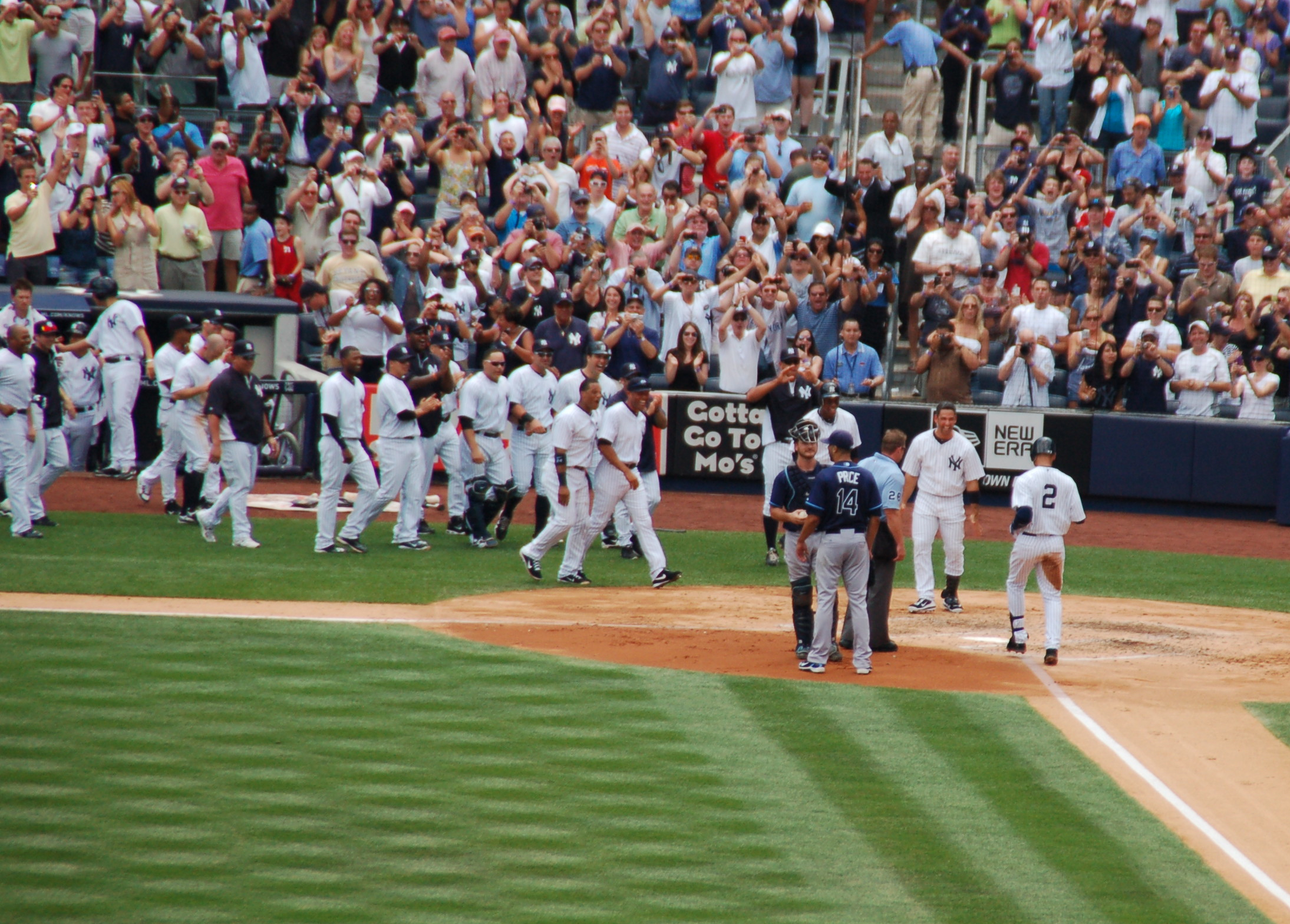
On July 9, 2011, Jeter achieved his 3,000th career hit, a home run off of David Price of the Tampa Bay Rays. He ended the day with five hits in five at-bats, becoming only the second player (after Craig Biggio) to have five hits on the day he achieved his 3,000th hit. He also became the second player, after Wade Boggs in 1999, to hit a home run for his 3,000th hit. The last of Jeter's five hits proved to be the game-winner. He is the only member of the 3,000 hit club to record all of his hits with the New York Yankees. Jeter joined Honus Wagner as only the second regular shortstop to reach the 3,000 hit plateau (though Wagner also played other positions and Cal Ripken Jr. and Robin Yount reached it after changing positions). Only Ty Cobb, Hank Aaron, and Robin Yount were younger than Jeter on the day of their 3,000th hit. MLB and HBO produced Derek Jeter 3K, a documentary profiling his path to 3,000 hits, which first aired on July 28, 2011.
Fatigued from the stress of chasing 3,000 career hits and needing to rest his calf, Jeter chose not to attend the 2011 MLB All-Star Game. On July 14, 2011, Jeter and Posada played their 1,660th game together, breaking the franchise record of 1,659 held by Gehrig and Tony Lazzeri. On August 29, 2011, Jeter played his 2,402nd game with the Yankees, surpassing Mickey Mantle's record for most games played as a Yankee. He finished the 2011 season with 162 hits, marking his 16th consecutive season with 150 hits, which tied him with Pete Rose for the second-most all-time, one behind Hank Aaron. Jeter was honored with the Lou Gehrig Memorial Award, recognizing his charitable endeavors.
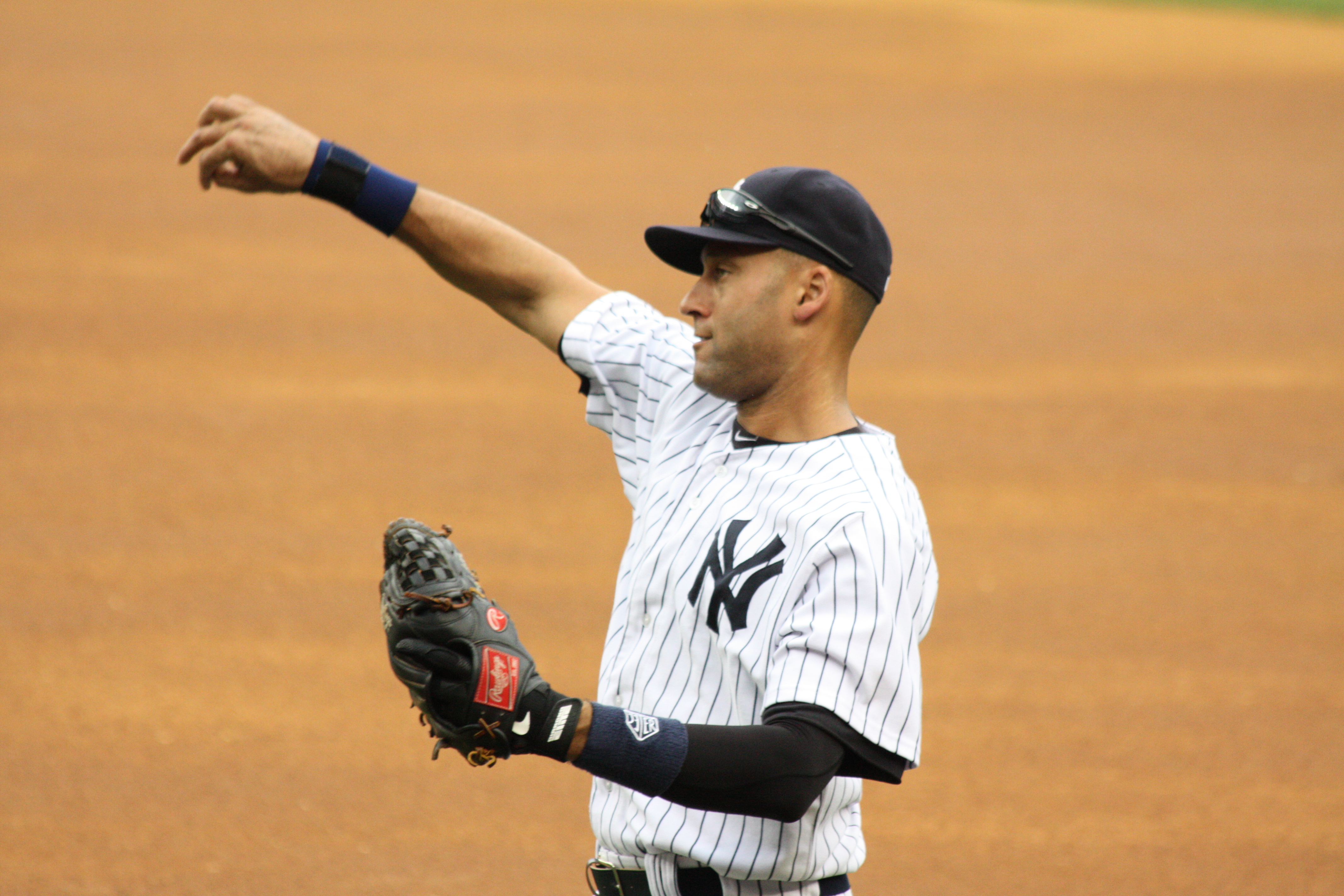
Despite ongoing concerns about his age, Jeter began the 2012 season on a hot streak, batting .420 through April 25. Alex Rodriguez commented that Jeter was playing as he did in 1999, while Joe Girardi remarked that Jeter looked 25 years old. In the 2012 MLB All-Star Game, Jeter recorded his 11th All-Star hit, surpassing Mantle for the most All-Star Game hits in Yankees history. Going 1-for-2 in the game, he moved into fourth all-time with a .458 average among players with a minimum of 12 plate appearances in the All-Star Game.
Jeter finished the 2012 season leading MLB with 216 hits. Against the Tampa Bay Rays on September 14, he moved into the Top 10 on the all-time hit list, surpassing Willie Mays by beating out an infield single for his 3,284th career hit. After hitting .364 in the 2012 ALDS, Jeter fractured his left ankle during Game 1 of the 2012 ALCS against the Detroit Tigers while reaching for a ground ball, an injury that ended his season. He had received a cortisone shot for a bone bruise in his left foot in September, which may have contributed to the break. Jeter underwent surgery on his broken left ankle on October 20, with an expected recovery time of four to five months.
While rehabilitating, Jeter suffered a small crack in the area of his previous ankle fracture, leading him to start the 2013 season on the disabled list. The Yankees activated Jeter on July 11, but after playing in just one game, he returned to the disabled list with a quadriceps strain. He returned to the Yankees lineup on July 28, hitting a home run on the first pitch off of Matt Moore of Tampa Bay. Jeter was again placed on the 15-day disabled list on August 5 due to a Grade 1 calf strain. After a brief return, he was placed on the 15-day disabled list for a third time on September 11 due to ankle issues, effectively ending his season. On September 14, 2013, Jeter was transferred to the 60-day disabled list. He batted just .190 in only 17 games played during the 2013 season.
2.3.5. 2014: Final season
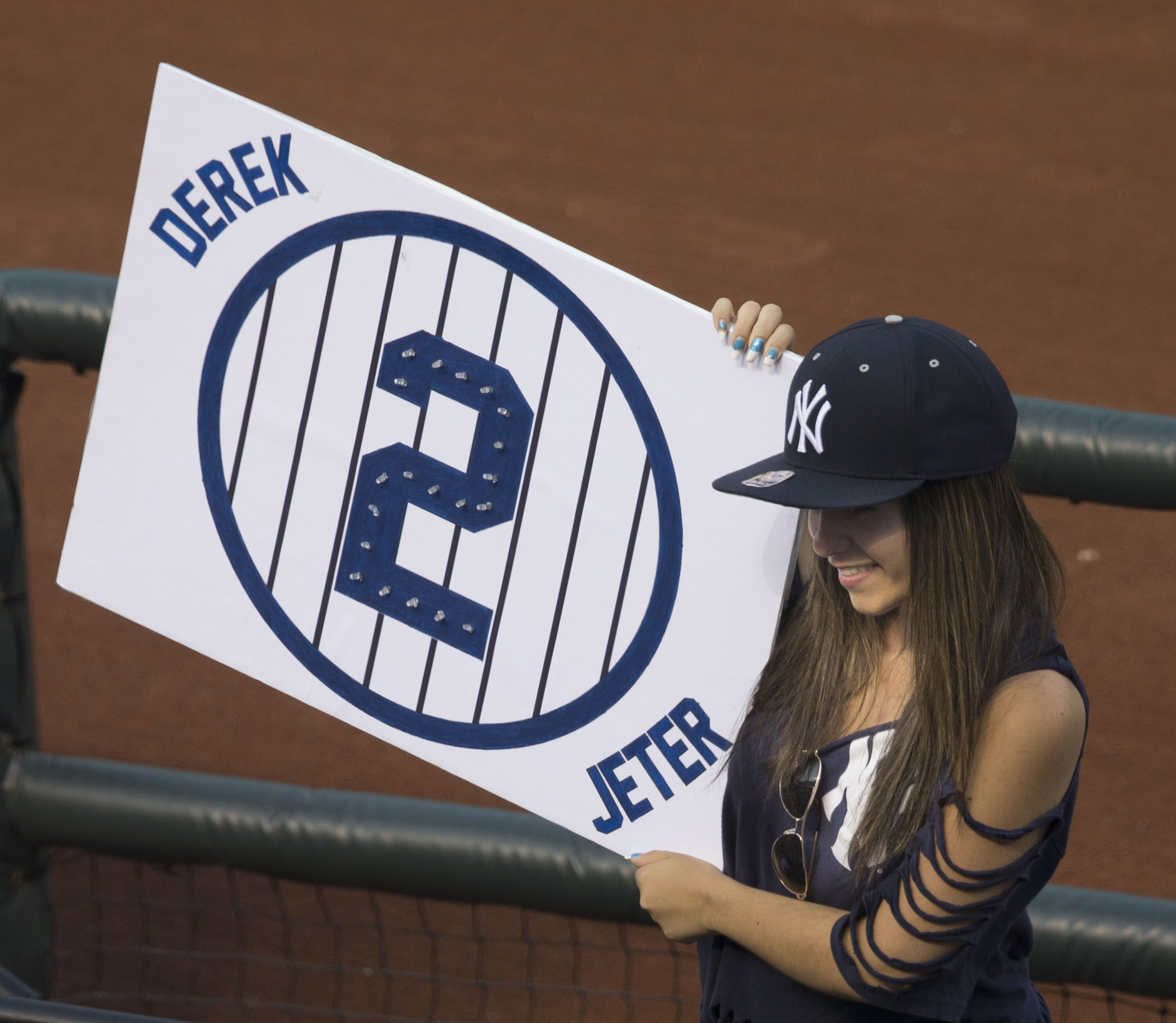
Jeter re-signed with the Yankees on a one-year, 12.00 M USD contract for the 2014 season. On February 12, 2014, he announced on his Facebook page that the 2014 season would be his last. Throughout his final season, each opposing team honored Jeter with a gift during his final visit to their city, often including donations to his charity, the Turn 2 Foundation.
On July 10, Jeter recorded his 1,000th career multi-hit game, becoming the fourth player to do so. He was elected to start at shortstop in the 2014 All-Star Game and batted leadoff for the AL. Jeter went 2-for-2, scored one run, and received two standing ovations in the four innings he played. His .481 career All-Star batting average (13-for-27) ranked him fifth all-time (among players with at least 10 at-bats). At 40, Jeter also became the oldest player to have two or more hits in an All-Star Game. In July, Jeter broke Omar Vizquel's MLB career record of 2,609 games started at shortstop, and Lou Gehrig's franchise career record of 534 doubles. On July 17, Derek scored the 1,900th run of his career, becoming the 10th player in MLB history to do so. Jeter passed Carl Yastrzemski for seventh place on MLB's all-time career hit list on July 28 and on August 11, he passed Honus Wagner, climbing to sixth on the all-time hits list.

The Yankees honored Jeter with a pregame tribute on September 7. Starting that day, the Yankees wore a patch on their hats and uniforms honoring Jeter for the remainder of the season. In the final week of Jeter's career, MLB Commissioner Bud Selig honored him as the 15th recipient of the Commissioner's Historic Achievement Award for being "one of the most accomplished shortstops of all-time."
During Jeter's final series at Yankee Stadium, Louisville Slugger announced they would retire their "P72" model baseball bat, the bat Jeter uses, though it would still be sold under the name "DJ2" in his honor. The average ticket price for Jeter's final home game, on September 25, reached 830 USD on the secondary market. In his final game at Yankee Stadium, Jeter hit a walk-off single against Orioles pitcher Evan Meek to win the game, 6-5.
Jeter decided to play exclusively as the designated hitter in the final series of his career, at Fenway Park in Boston, so that his final memories of playing shortstop would be at Yankee Stadium. The Red Sox honored Jeter with a pregame ceremony featuring Red Sox retired stars like Carl Yastrzemski, Jim Rice, Fred Lynn, Luis Tiant, and Rico Petrocelli, as well as sports figures like the Boston Bruins' Bobby Orr, New England Patriots receiver Troy Brown, and the Boston Celtics' Paul Pierce. Many Boston fans at Fenway Park loudly cheered for Jeter and gave him a standing ovation. In his final at-bat, he hit an RBI infield single against Clay Buchholz, before being substituted for pinch runner Brian McCann, receiving another ovation from the Red Sox fans as he exited the field.
2.4. International Career: World Baseball Classic
Jeter started at shortstop for the United States national baseball team in the 2006 World Baseball Classic. He hit 9-for-20 (.450) and scored five runs in six games. Only teammate Ken Griffey Jr. (.524) and Cuba's Yoandy Garlobo (.480) had a higher batting average with a minimum of 20 at-bats. Jeter's play earned him recognition as the shortstop selection on the All-Tournament Team.
In the 2009 World Baseball Classic, Jeter again started at shortstop. He was named captain of the United States team by manager Davey Johnson, and he batted 8-for-29 (.276) in eight games. Jeter and the United States team faced the Yankees at Steinbrenner Field in an exhibition game, the only time Jeter played against the Yankees. Jeter was an early and strong advocate for international baseball competition, being the first player to support the creation of the World Baseball Classic.
3. Player Profile and Style of Play
Derek Jeter is widely regarded as one of the most consistent baseball players of all time, known for his unique blend of offensive prowess, defensive highlights, and exemplary leadership.
3.1. Batting Style and Clutch Performance
Jeter averaged 204 hits, 113 runs scored, and 21 stolen bases per 162 games throughout his career. He is currently sixth on the all-time hits list in MLB history. Highly competitive, Jeter once stated, "If you're going to play at all, you're out to win. Baseball, board games, playing Jeopardy!, I hate to lose." His consistent performance led many to view him as one of the best players of his generation.
An aggressive hitter, Jeter typically swung at most pitches in or near the strike zone. While most right-handed hitters tend to pull the ball to left field, Jeter's distinctive inside-out swing, dubbed the "Jeterian Swing," resulted in most of his hits going to center and right field. Similarly, most of his home runs were hit to right field, often taking advantage of Yankee Stadium's relatively close right-field fences.
Jeter is especially noted for his exceptional postseason performances, earning him the titles of "Captain Clutch" and "Mr. November." He holds a career .309 postseason batting average and a .321 batting average in the World Series. With the exception of 2008, 2013, and 2014, the Yankees qualified for the postseason every year of Jeter's major league career. He holds MLB postseason records for games played (158), plate appearances (734), at-bats (650), hits (200), singles (143), doubles (32), triples (5), runs scored (111), total bases (302), and strikeouts (135). He also ranks fourth in home runs (20), fourth in runs batted in (61), fifth in base on balls (66), and sixth in stolen bases (18) in postseason history.
3.2. Defensive Play and Criticism
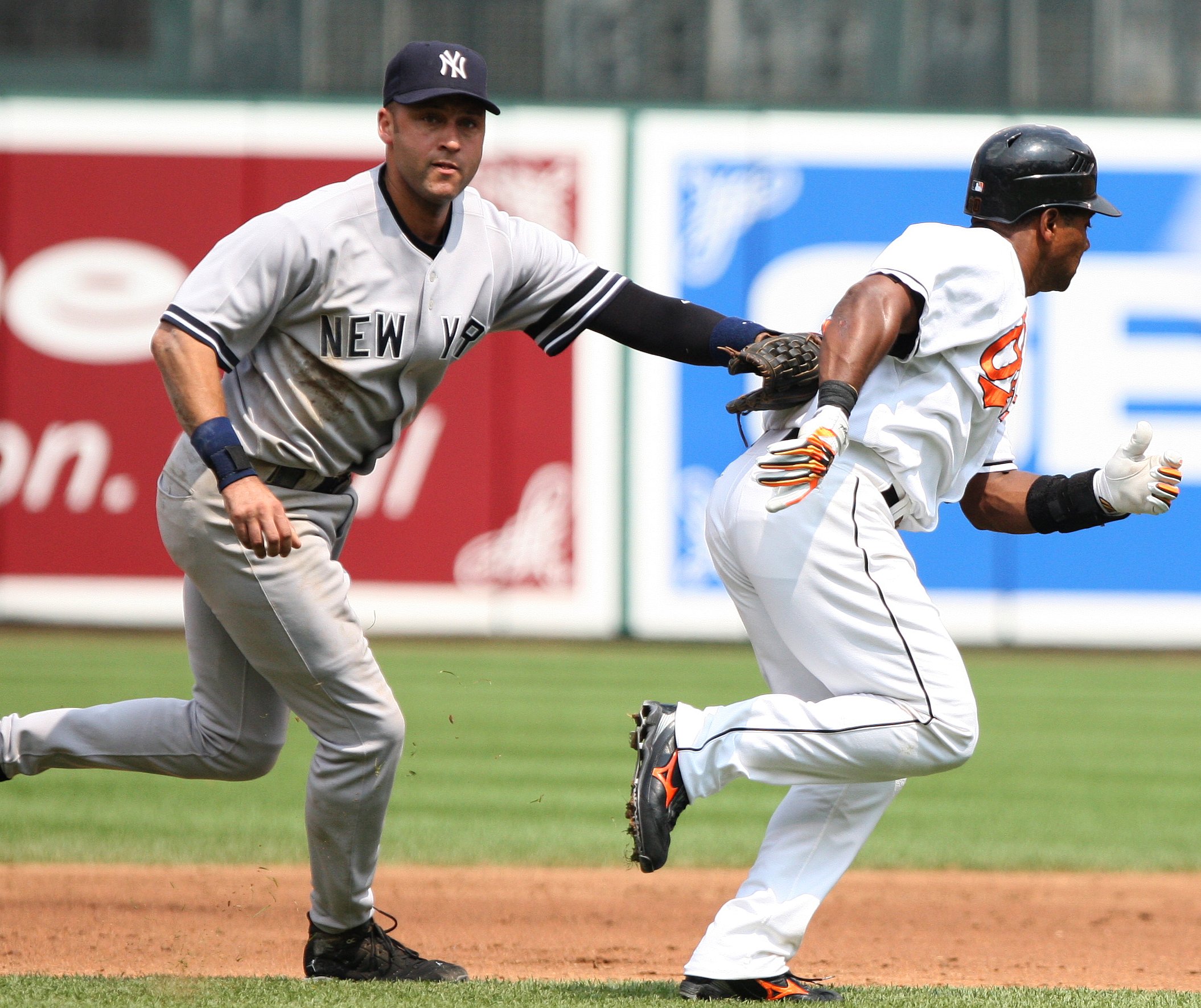
Jeter won five Gold Glove Awards at shortstop, trailing only Omar Vizquel, Ozzie Smith, Luis Aparicio, Dave Concepción, and Mark Belanger for most by a shortstop. He was praised for his excellent positioning and quick release when throwing the ball. One of his signature defensive plays is the "jump-throw," where he leaps and throws to first base while moving towards third base.
Despite these accolades, Jeter's defense was a frequent subject of criticism from a number of sabermetricians, including Rob Neyer and Baseball Prospectus. The 2006 book The Fielding Bible by John Dewan featured an essay by Bill James concluding that Jeter "was probably the most ineffective defensive player in the major leagues, at any position" over his entire career. A 2008 study by researchers at the University of Pennsylvania found that, from 2002 through 2005, Jeter was the worst defensive shortstop in MLB. Even in 2010, when he received his fifth Gold Glove Award, sites that rely on advanced defensive statistics, such as FanGraphs.com and FieldingBible.com, rated him below middle-of-the-pack status.
Jeter committed 18 errors in 2007, his highest total since finishing with 24 in 2000. Following that season, Yankees General Manager Brian Cashman and his staff identified Jeter's defense as an area needing improvement. At the Yankees' request, Jeter undertook a rigorous training program focused on improving his lateral movement and first-step quickness to counter the effects of age. This led to an improvement in his ultimate zone rating (UZR) from worst among AL shortstops in 2007 to near league average in 2008.
When asked to respond to criticism of his defense, Jeter famously replied, "I play in New York, man. Criticism is part of the game, you take criticism as a challenge." He also asserted that many defensive factors cannot be quantified by statistics alone. The debate over Jeter's fielding became a flash point in the broader discussion of whether statistical analyses or subjective observation is the superior method to assess a player's defensive ability, and also led to criticism of the Gold Glove Award voting process.
3.3. Leadership and Professionalism
Derek Jeter is renowned for his exceptional professionalism and leadership qualities, both on and off the field. In an era often marked by personal scandals among professional athletes, he largely avoided major controversy throughout his high-profile career in New York City, while maintaining a strong work ethic. His composed demeanor and style of play earned him high esteem from both opponents and teammates. Curt Schilling, a former rival pitcher, once commented that Jeter has "always been above the fray" and "turned in a first-ballot Hall of Fame career in the hardest environment in sports to do any/all of the above." As a clubhouse leader, Jeter was known for his ability to defuse confrontations and maintain team harmony.
4. Post-Playing Career
After retiring as a player, Derek Jeter transitioned into various roles within the baseball world and the business sector, leveraging his experience and strong public image.
4.1. Business Ventures
During his injury-shortened 2013 season, Jeter established a partnership with Simon & Schuster to form an imprint called Jeter Publishing. He described it as "the blueprint for postcareer," intending to publish nonfiction books for adults, children's picture books, elementary grade fiction, and books for children learning to read. The partnership was also designed to potentially expand into film and television productions.
On October 1, 2014, Jeter launched his new website, ThePlayersTribune.com, which he billed as "a new media platform that will present the unfiltered voice of professional athletes, bringing fans closer to the games they love than ever before." In March 2015, the Tampa Bay Business Journal reported that Jeter had partnered with Concessions Tampa to bid for a space within the Tampa International Airport, planning to open a restaurant named after his website.
Jeter also serves as a brand development officer for Luvo Inc., a healthy food company, and holds investment interests in Whistle Sports Network, a multi-channel video network company. In 2014, he explored purchasing the Buffalo Bills football team. In April 2021, Jeter joined the board of Rockefeller Capital Management.
4.2. Miami Marlins Ownership and CEO
In July 2017, Jeter actively engaged in the bidding process for ownership of the Miami Marlins. In August 2017, he and Bruce Sherman finalized a deal to purchase the team. The sale was officially completed in September 2017, receiving unanimous approval from the other 29 MLB team owners. Although Jeter held only a 4% stake in the franchise, he was appointed chief executive officer (CEO) of the team, with Sherman, the controlling owner, entrusting him to oversee the team's day-to-day operations.
On February 28, 2022, Jeter announced his departure from his role as CEO of the Marlins and stated he would no longer hold any shares in the club. After more than four years leading the organization, he ended his relationship with the team and sold his 4% ownership stake.
4.3. Current Activities
After leaving the Miami Marlins, Jeter has continued his involvement in the sports and business world. On September 8, 2022, he announced the launch of Arena Club, a card grading, storage vault, and marketplace platform, in collaboration with entrepreneur Brian Lee and several capital venture firms. In February 2023, during Fox Sports' pregame coverage of Super Bowl LVII, Jeter revealed that he would be joining Fox Sports as a studio analyst for their MLB coverage.
5. Personal Life
Derek Jeter's personal life, particularly his relationships and residences, has often garnered media attention throughout his career and retirement.
5.1. Residences and Financial Matters
Jeter has owned residences in Marlboro Township, New Jersey, Greenwood Lake, New York, and the Davis Islands neighborhood of Tampa, Florida. He previously owned a penthouse apartment in Manhattan's Trump World Tower, which he sold for 15.50 M USD in 2012.
In 2008, Jeter settled a tax dispute with the New York State Department of Taxation and Finance concerning his official residence. New York State alleged that Jeter should have paid state income tax from 2001 to 2003, as he resided in the Manhattan apartment he purchased in 2001. Jeter, however, claimed to have established his residence in Tampa, Florida, in 1994, and maintained that he was still a resident of Florida at the time. Florida has no state income tax. As of 2020, Jeter and his wife reside in Miami. In September 2020, they listed their waterfront Tampa home for 29.00 M USD. They subsequently listed their Greenwood Lake home in March 2021.
In December 2002, Yankees owner George Steinbrenner publicly criticized Jeter for staying out until 3 a.m. at a birthday party during the 2002 season, stating his shortstop "wasn't totally focused." The two later famously mocked this incident in a May 2003 Visa commercial, reminiscent of how Steinbrenner and former Yankees manager Billy Martin previously satirized their feud in a Miller Lite commercial in the 1970s.
5.2. Relationships and Family
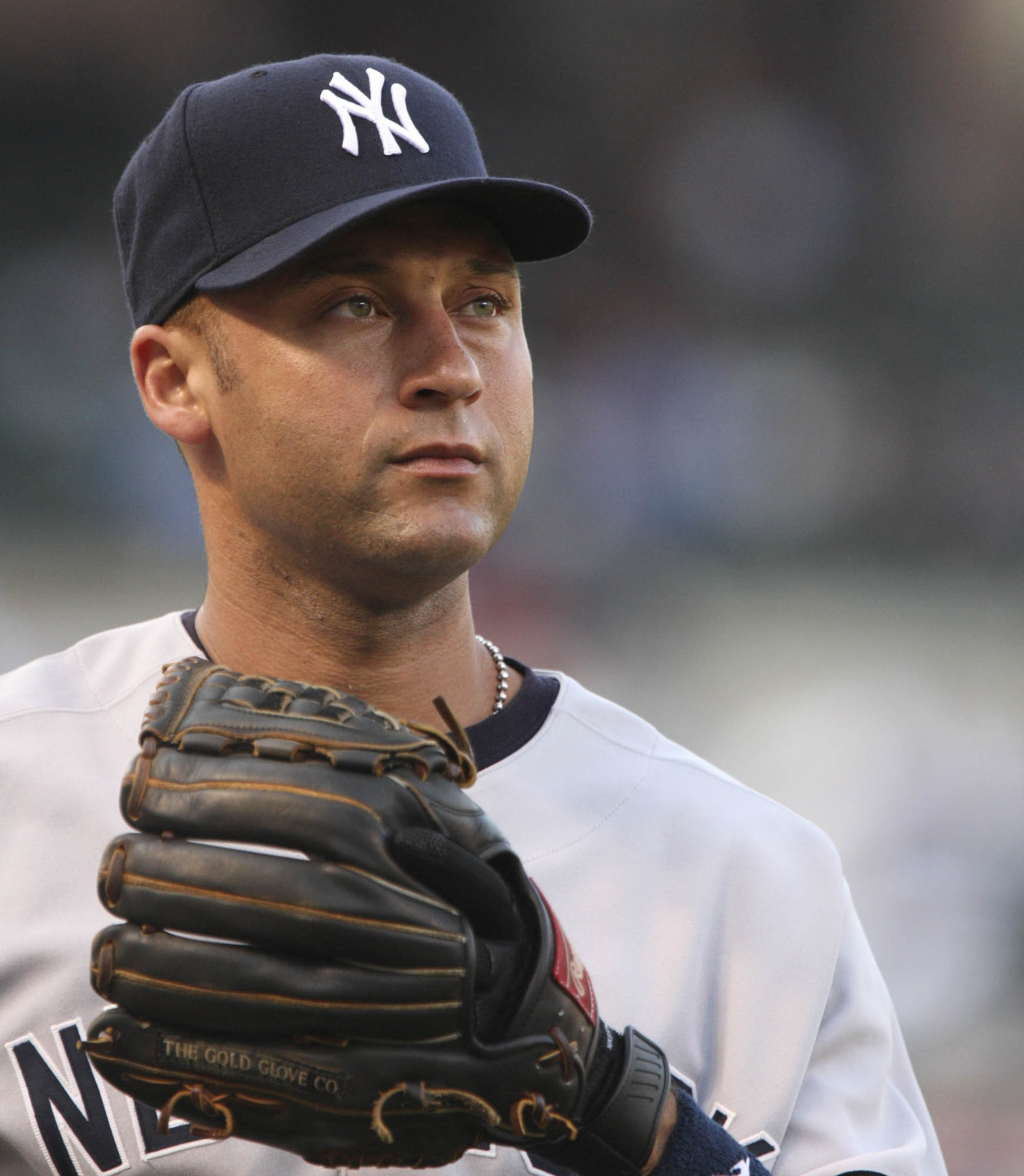
Jeter's personal life has been a frequent subject in gossip columns and celebrity magazines since his rookie year in 1996. He had a well-publicized relationship with singer-songwriter Mariah Carey from 1997 to 1998, with Carey even cowriting the song "The Roof (Back in Time)" about their first kiss. Jeter has also reportedly dated model Vida Guerra, former Miss Universe Lara Dutta, singer Joy Enriquez, television personality Vanessa Minnillo, and actresses Jordana Brewster, Jessica Biel, and Minka Kelly.
Jeter was raised Catholic, attending Catholic schools as a child and identifying with the faith while playing for the Yankees.
In 2015, Jeter became engaged to Sports Illustrated Swimsuit Issue cover model Hannah Davis, whom he had been dating since 2012. They married in July 2016. The couple has three daughters, born in August 2017, January 2019, and December 2021, and a son, born in May 2023.
6. Philanthropy and Public Image
Derek Jeter has actively engaged in philanthropic efforts throughout his career and retirement, while also maintaining a highly marketable public image through various endorsements and media appearances.
6.1. Turn 2 Foundation
In 1996, Jeter established the Turn 2 Foundation, a charitable organization dedicated to helping children and teenagers avoid drug and alcohol addiction, and to rewarding those who demonstrate high academic achievement. In recognition of his foundation's work, Jeter received an honorary doctorate from Siena College in 2012.
Since 2009, Jeter has served as an ambassador for Weplay, a website designed to encourage children to participate in sports. Jeter, along with Japanese baseball player Hideki Matsui, participated in a charity baseball game at Tokyo Dome to raise funds for survivors of the 2011 Tōhoku earthquake and tsunami.
In 2018, Jeter donated furniture and household items to families displaced by Hurricane Irma. In July 2019, the Turn 2 Foundation donated 3.20 M USD to the Kalamazoo Public School District to renovate the school's baseball and softball complex.
6.2. Endorsements and Media Appearances

Jeter has appeared in national advertising campaigns for numerous major brands, including Nike, Gatorade, Fleet Bank, Subway, Ford, VISA, Discover Card, Florsheim, Gillette, Skippy, and XM Satellite Radio. He also endorses a cologne named Driven, developed in collaboration with and distributed by Avon. Jeter has his own Jumpman shoe with Nike. To commemorate Jeter's final year in 2014, the Jordan brand released a tribute commercial titled "#RE2PECT", which featured many baseball players and celebrities, including rival Boston Red Sox fans, tipping their caps to him.
In 2006, Jeter was the second-highest paid endorser in baseball, behind Ichiro Suzuki, who benefited from extensive endorsement deals in Japan. He was consistently ranked as the most marketable player in baseball according to the 2003, 2005, and 2010 Sports Business Surveys. A 2011 list by the marketing firm Nielsen also identified Jeter as the most marketable player in baseball, based on personal attributes such as sincerity, approachability, experience, and influence.
6.3. Other Appearances
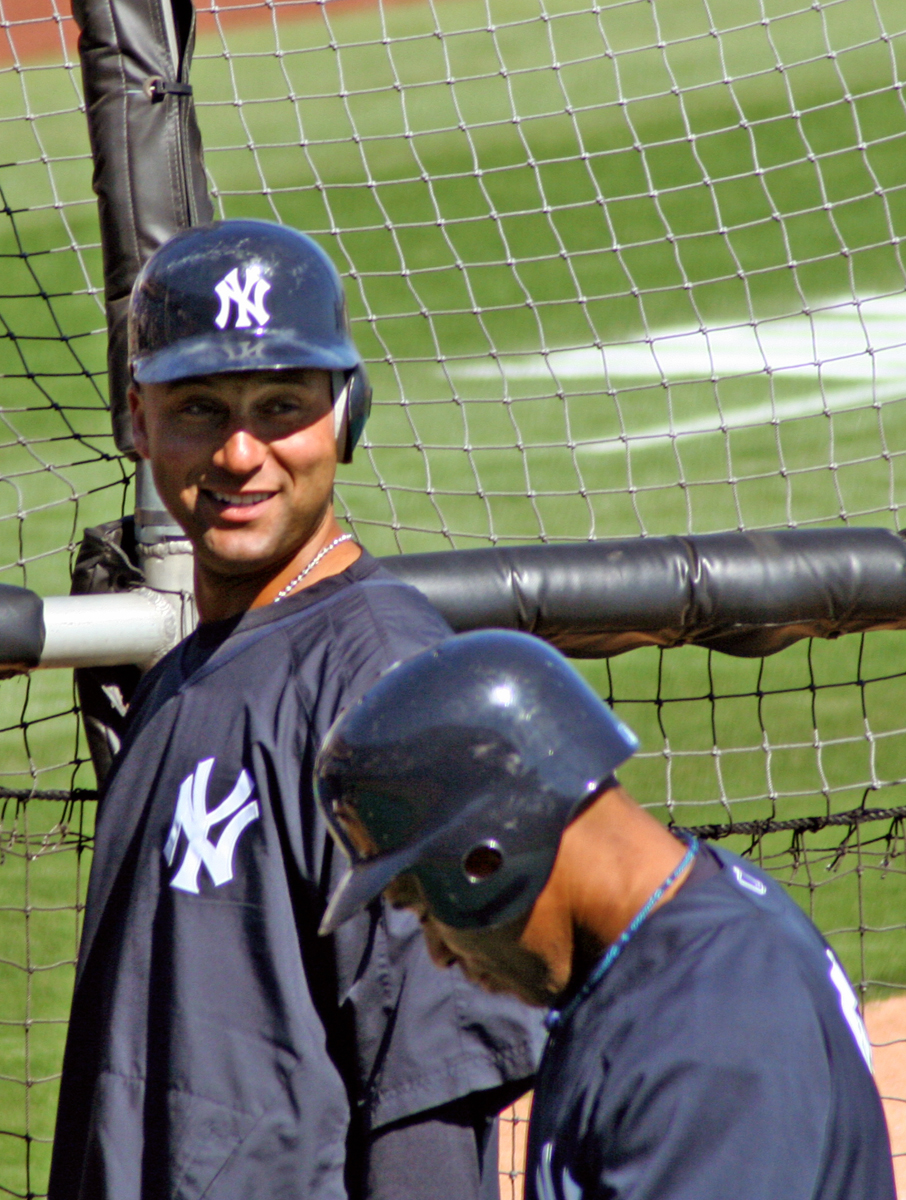
Jeter has made various appearances outside of baseball. He has been a guest actor on television sitcoms such as Seinfeld (in "The Abstinence" episode) and Saturday Night Live (in Season 27, episode 7). He also had cameo appearances in the comedy films Anger Management and The Other Guys. In 2005, he was the subject of a segment on the TV news magazine 60 Minutes, and in 2014, he was featured in an episode of Finding Your Roots, a Public Broadcasting Service (PBS) television series. Jeter also appeared as a character in the Broadway play Bronx Bombers. In February 2015, he made an appearance alongside Peyton Manning to celebrate Saturday Night Live's 40th Anniversary.
Jeter has been featured on the covers of several video games, including 2K Sports' MLB 2K5, MLB 2K6, and MLB 2K7; Acclaim Entertainment's All-Star Baseball series; and Gameloft's wireless phone baseball game, Derek Jeter Pro Baseball 2008. A wax figure of Jeter is immortalized at the Madame Tussauds Wax Museum in New York, and a sculpture is displayed at the Louisville Slugger Museum & Factory in Louisville, Kentucky. The Captain, a documentary miniseries about Jeter's life and career, debuted on ESPN on July 18, 2022. During Fox Sports' pregame coverage of Super Bowl LVII, Jeter announced that he would be joining Fox Sports as a studio analyst for their MLB coverage.
7. Honors and Awards
Derek Jeter has received numerous honors, awards, and recognitions throughout and after his distinguished playing career, cementing his legacy in baseball.
7.1. Baseball Hall of Fame Induction
On January 21, 2020, Jeter was elected to the Baseball Hall of Fame as part of its class of 2020 in his first year of eligibility. He received 396 out of 397 possible votes (99.75%), falling just one vote shy of being the second unanimous selection in Hall of Fame history. This percentage is second only to his former teammate Mariano Rivera (100%) and higher than Ken Griffey Jr. (99.3%). He was formally enshrined in a ceremony on September 8, 2021, in Cooperstown, New York.
7.2. Jersey Retirement and Memorials
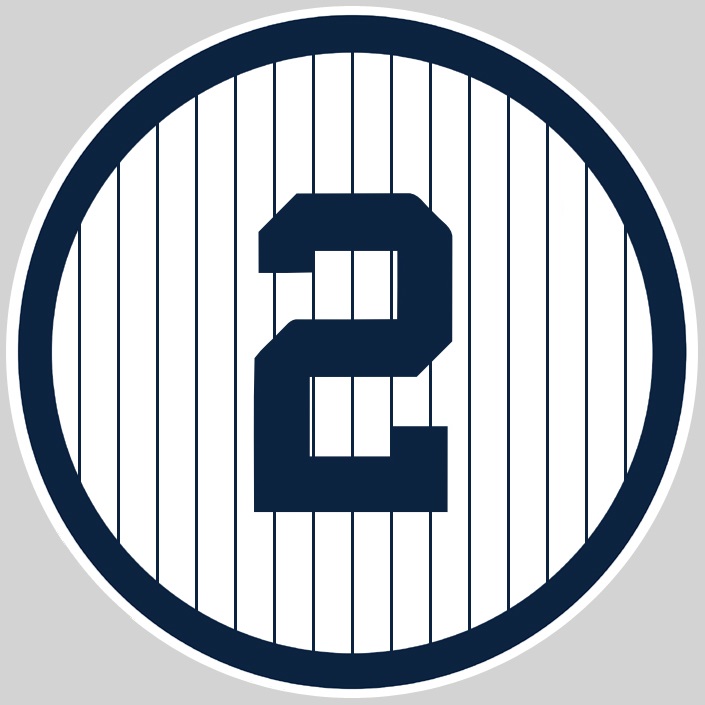
Kalamazoo Central High School inducted Jeter into its athletic hall of fame in 2003 and renamed its baseball field in his honor in 2011. In 2015, Jeter was inducted into the New Jersey Hall of Fame. The New York Yankees retired Jeter's uniform number 2 and unveiled a plaque in his honor that was installed at Monument Park in a pregame ceremony on May 14, 2017.
7.3. Major Awards and Recognitions
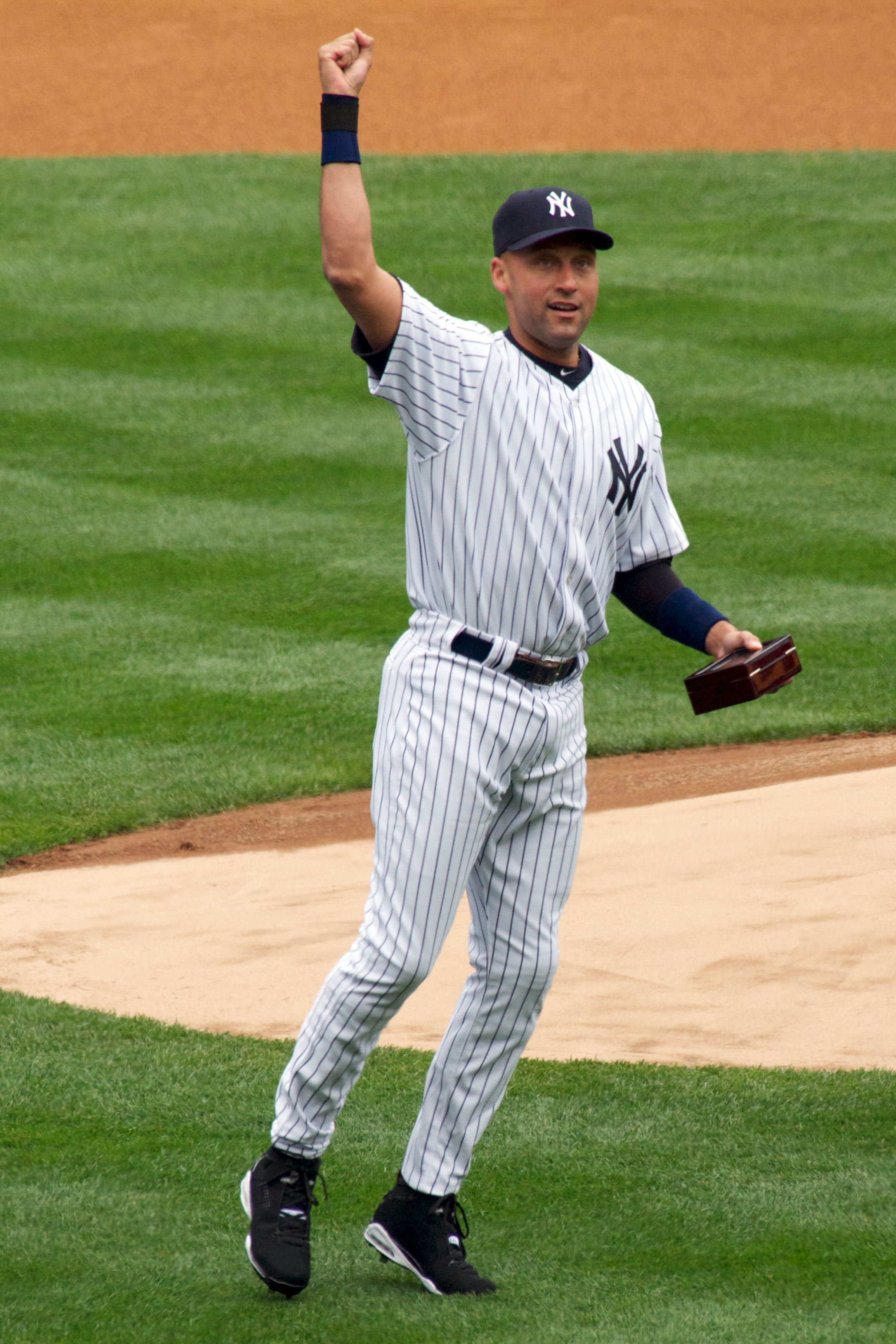

| Award / Honor | Time(s) | Date(s) |
|---|---|---|
| AL All-Star | 14 | 1998, 1999, 2000, 2001, 2002, 2004, 2006, 2007, 2008, 2009, 2010, 2011, 2012, 2014 |
| New York Yankees Player of the Year | 5 | 1998, 1999, 2000, 2006, 2009 |
| AL Gold Glove Award (SS) | 5 | 2004, 2005, 2006, 2009, 2010 |
| AL Silver Slugger Award (SS) | 5 | 2006, 2007, 2008, 2009, 2012 |
| Hank Aaron Award | 2 | 2006, 2009 |
| GIBBY Awards Moment of the Year | 2 | 2008, 2009 |
| All-Star Game Most Valuable Player Award | 1 | 2000 |
| World Series Most Valuable Player Award | 1 | 2000 |
| Babe Ruth Award | 1 | 2000 |
| AL Rookie of the Year | 1 | 1996 |
| Roberto Clemente Award | 1 | 2009 |
| Sports Illustrated Sportsman of the Year | 1 | 2009 |
| Lou Gehrig Memorial Award | 1 | 2010 |
| ESPY Awards Best MLB Player | 1 | 2007 |
| ESPY Awards Best Play ESPY Award | 1 | 2002 |
| Baseball Digest Player of the Year | 1 | 2006 |
| GIBBY Awards Hitter of the Year Award | 1 | 2006 |
| Baseball America 1st-Team Major League All-Star (SS) | 1 | 2006 |
| GIBBY Awards Play of the Year | 1 | 2004 |
| Players Choice Award Rookie of the Year | 1 | 2004 |
| The Sporting News "Good Guy in Sports" Award | 1 | 2002 |
| Joan Payson Award for Community Service | 1 | 1997 |
| International League All-Star | 1 | 1995 |
| Florida State League All-Star | 1 | 1994 |
| Florida State League Most Valuable Player | 1 | 1994 |
| Baseball America Minor League Player of the Year | 1 | 1994 |
| The Sporting News Minor League Player of the Year | 1 | 1994 |
| Topps/NAPBL Minor League Player of the Year | 1 | 1994 |
| New York Yankees Minor League Player of the Year | 1 | 1994 |
| South Atlantic League All-Star | 1 | 1993 |
| South Atlantic League's Best Defensive Shortstop, Most Exciting Player, Best Infield Arm | 1 | 1993 |
| American Baseball Coaches Association High School Player of the Year | 1 | 1992 |
| USA Today High School Player of the Year | 1 | 1992 |
| Gatorade High School Athlete of the Year | 1 | 1992 |
| Inductee in Kalamazoo Central High School Athletic Hall of Fame | 1 | 2007 |
| Sporting News All-Decade Team (shortstop) | 1 | 2009 |
| Sports Illustrated MLB All-Decade Team (shortstop) | 1 | 2009 |
| GIBBY Awards Performance of the Year | 1 | 2011 |
| GIBBY Awards Moment of the Year | 1 | 2014 |
| GIBBY Awards Walk-Off of the Year | 1 | 2014 |
7.4. Career Statistical Highlights
Derek Jeter's career is marked by numerous statistical achievements, placing him among the all-time leaders in various categories for both MLB and the New York Yankees.
- Led League
- Singles (1997, 1998)
- Runs scored (1998)
- Hits (1999, 2012)
- League Top-Ten
- Hits (1997-2002, 2004-2007, 2009, 2012)
- Runs scored (1997-2006, 2009, 2012)
- Batting average (1998-2001, 2003-2007, 2009, 2012)
- Total bases (1999)
- AL MVP voting (1997-2001, 2003-2009)
- AL hitters (1997, 1999-2000, 2003, 2009)
Year Team Games Plate Appearances At Bats Runs Hits Doubles Triples Home Runs Total Bases RBIs Stolen Bases Caught Stealing Sacrifice Bunts Sacrifice Flies Walks Intentional Walks Hit By Pitch Strikeouts Double Plays Batting Average On-Base Percentage Slugging Percentage OPS 1995 NYY 15 51 48 5 12 4 1 0 18 7 0 0 0 0 3 0 0 11 0 .250 .294 .375 .669 1996 157 654 582 104 183 25 6 10 250 78 14 7 6 9 48 1 9 102 13 .314 .370 .430 .800 1997 159 748 654 116 190 31 7 10 265 70 23 12 8 2 74 0 10 125 14 .291 .370 .405 .775 1998 149 694 626 127 203 25 8 19 301 84 30 3 3 3 57 1 5 119 13 .324 .384 .481 .864 1999 158 739 627 134 219 37 9 24 346 102 19 3 3 6 91 5 12 116 12 .349 .438 .552 .989 2000 148 679 593 119 201 31 4 15 285 73 22 4 3 3 68 4 12 99 14 .339 .416 .481 .896 2001 150 686 614 110 191 35 3 21 295 74 27 3 5 1 56 3 10 99 13 .311 .377 .480 .858 2002 157 730 644 124 191 26 0 18 271 75 32 3 3 3 73 2 7 114 14 .297 .373 .421 .794 2003 119 542 482 87 156 25 3 10 217 52 11 5 3 1 43 2 13 88 10 .324 .393 .450 .844 2004 154 721 643 111 188 44 1 23 303 78 23 4 16 2 46 1 12 99 19 .292 .352 .471 .823 2005 159 752 654 122 202 25 5 19 294 70 14 5 7 3 77 3 11 117 15 .309 .389 .450 .839 2006 154 715 623 118 214 39 3 14 301 97 34 5 7 4 69 4 12 102 13 .343 .417 .483 .900 2007 156 714 639 102 206 39 4 21 289 73 15 8 3 2 56 3 14 100 21 .322 .388 .452 .840 2008 150 668 596 88 179 25 3 11 243 69 11 5 7 4 52 0 9 85 24 .300 .363 .408 .771 2009 153 716 634 107 212 27 1 18 295 66 30 5 4 1 72 4 5 90 18 .334 .406 .465 .871 2010 157 739 663 111 179 30 3 10 245 67 18 5 1 5 63 4 9 106 22 .270 .340 .370 .710 2011 131 607 546 84 162 24 4 6 212 61 16 6 4 3 46 0 6 81 10 .297 .355 .388 .743 2012 159 740 683 99 216 32 0 15 293 54 9 4 6 1 45 1 5 90 24 .316 .362 .429 .791 2013 17 73 63 8 12 1 0 1 16 7 0 0 0 1 8 1 1 10 3 .190 .288 .254 .542 2014 145 634 581 47 149 19 1 4 182 50 10 2 8 4 35 0 6 87 15 .256 .304 .313 .617 Career: 20 years 2747 12602 11195 1923 3465 544 66 260 4921 1311 358 97 97 58 1082 39 170 1840 287 .310 .377 .440 .817 Year Team Games Plate Appearances At Bats Runs Hits Doubles Triples Home Runs Total Bases RBIs Stolen Bases Caught Stealing Sacrifice Bunts Sacrifice Flies Walks Intentional Walks Hit By Pitch Strikeouts Double Plays Batting Average On-Base Percentage Slugging Percentage OPS 1996 NYY 15 67 61 12 22 3 0 1 28 3 3 0 1 0 4 0 1 13 1 .361 .409 .459 .868 1997 5 24 21 6 7 1 7 2 14 2 1 0 0 0 3 0 0 5 0 .333 .417 .667 1.083 1998 13 61 51 7 12 1 1 0 15 3 3 0 3 0 7 0 0 10 2 .235 .328 .294 .622 1999 12 53 48 10 18 3 1 1 26 4 3 1 0 0 5 0 0 9 0 .375 .434 .542 .976 2000 16 75 63 13 20 2 1 4 36 9 1 1 0 0 11 0 1 18 0 .317 .427 .571 .998 2001 17 70 62 5 14 1 0 1 18 4 0 1 1 2 3 0 2 8 0 .226 .275 .290 .566 2002 4 19 16 6 8 4 0 1 15 1 0 1 0 0 1 0 0 2 1 .500 .529 .938 1.467 2003 17 78 70 10 22 5 0 2 33 5 2 0 0 0 7 1 1 13 2 .314 .385 .471 .856 2004 11 59 49 8 12 2 0 1 17 9 2 0 3 0 7 0 0 6 1 .245 .339 .347 .686 2005 5 23 21 4 7 0 0 2 13 5 1 0 0 1 1 0 0 5 0 .333 .348 .619 .967 2006 4 17 16 4 8 4 0 1 15 1 0 1 0 0 1 0 0 2 1 .500 .529 .938 1.467 2007 4 17 17 0 3 0 0 0 3 1 0 0 0 0 0 0 0 4 3 .176 .176 .176 .353 2009 15 74 64 14 22 5 0 3 36 6 0 1 0 1 10 2 0 11 2 .344 .432 .563 .995 2010 9 42 40 2 10 3 1 0 15 2 1 0 0 0 2 0 0 10 1 .250 .286 .375 .661 2011 5 25 24 6 6 1 0 0 7 2 1 0 0 0 1 0 0 8 1 .250 .280 .292 .572 2012 6 30 27 4 9 1 1 0 12 2 0 0 1 0 2 0 0 10 0 .333 .379 .444 .824 Career: 16 years 158 734 650 111 200 32 5 20 302 61 18 5 9 4 66 3 5 135 14 .308 .374 .465 .839